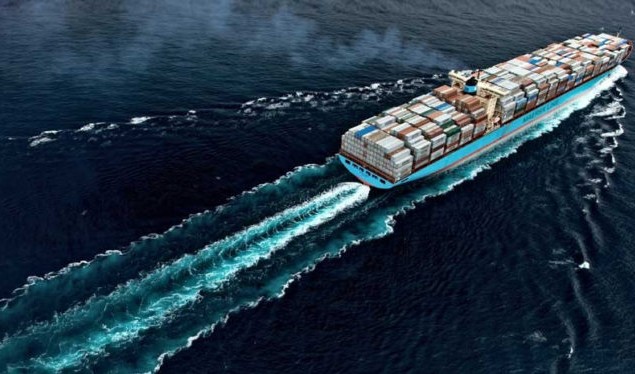Etihad Airways kicks off First Carbon Offset Program
In a move towards sustainable aviation, Etihad Airways has committed to purchasing...

KARACHI: The obstruction of the Suez Canal earlier this year served as a vivid reminder of the importance of maritime transport for economies around the globe. The blockage was resolved within a matter of days, but a much more existential challenge remains for the shipping industry.
The maritime industry is under increasing pressure to curb its greenhouse gas emissions, which account for approximately 3 per cent of the global emissions annually.
The sector is highly dependent on heavy fuel oil, a high-carbon fossil fuel that closely resembles tar. In the light of this, decarbonising the current global sailing fleet of approximately 100,000 ships represents a mammoth task that will require more energy efficient ships, as well as revolutionising the industry’s entire fuel supply chain.
A new World Bank report, “The Potential of Zero-Carbon Bunker Fuels in Developing Countries,” finds that energy-efficient technology alone will not be enough to decarbonise the industry. Rather, the feasibility of reaching net-zero emissions hinges on the adoption and use of zero-carbon bunker fuels.
Moreover, a second report, “The Role of LNG in the Transition Towards Low- and Zero-Carbon Shipping,” shows that alternative fuels such as liquefied natural gas (LNG) have an uncertain, and at best limited, greenhouse gas emissions reduction potential.
Leveraging expert support from the University Maritime Advisory Services, the World Bank analysed three categories of future zero-carbon bunker fuel options:
Biofuels such as biomethane, bioethanol and biomethanol are produced from a biogenic feedstock, which is currently derived from plants, agricultural waste, or in the future, algae. Biofuels emit CO2 when burned in an internal combustion engine, but retrieve CO2 from the atmosphere during the production of their feedstock. Thus, they are usually labelled as net-zero fuel from a lifecycle perspective.
The second category of zero-carbon fuels considered were ‘green’ and ‘blue’ ammonia and hydrogen. Green hydrogen is produced from water using renewable electricity, while blue hydrogen is made from natural gas making use of carbon capturing and storage technology.
Either kind of hydrogen can then be used as a fuel or be further processed into ammonia. Both hydrogen and ammonia can be used in internal combustion engines, and fuel cells.
Synthetic carbon-based fuels, such as synthetic methanol and synthetic methane are produced by combining green or blue hydrogen with carbon retrieved from the atmosphere.
After assessing each zero-carbon fuel’s features from an environmental, economic, and technical perspective, ammonia and hydrogen stood out as the most promising future zero-carbon bunker fuels due to their scalability, their cost-effectiveness, and low greenhouse gases lifecycle emissions in the long-term.
Further, both fuels can be produced from either renewable electricity (resulting in ‘green’ ammonia or hydrogen as the preferred option) or from natural gas, with the resulting carbon emissions captured and securely stored underground (resulting in ‘blue’ ammonia or hydrogen as a potential alternative in the near term); thereby, overcoming any concerns regarding production capacity constraints.
The analysis conducted does not rule out biofuels and synthetic carbon-based fuels, but found some limitations regarding their sustainable large-scale availability and cost-competitiveness.
According to estimates, decarbonising shipping represents a more than $1 trillion investment opportunity for business and development. The transition of the shipping industry towards ammonia and hydrogen is likely to change the landscape of the global bunker fuels market, creating new opportunities for the developing countries, particularly for those with significant renewable energy resources, such as Brazil, India, Malaysia, and Mauritius.
Future investments in this more inclusive and decentralised bunker fuel market will support the developing countries general economic development, as well as help them achieve their wider energy transition flexibly and at a lower cost.
A high-level assessment conducted within the report, outlines which countries are best positioned to become future producers, suppliers, or exporters of zero-carbon bunker fuels.
To initiate and accelerate the shipping’s energy transition the playing field between polluting and non-polluting fuels must be levelled, for example through the implementation of a meaningful carbon price.
This would compel the ships to pay for each tonne of greenhouse gases released into the atmosphere, applying the “polluter pays principle”. Revenue generated from such a mechanism could be used to fund further research on zero-carbon fuels, as well as support a fair energy transition in the developing countries that need it most, such as small island states.
While a meaningful carbon price would create enabling conditions, the uptake of zero carbon fuels can ultimately only be facilitated through global cooperation between ship owners, shipyards, engine manufacturers, fuel producers and distributors, classification societies, and charterers.
Progressive organisations such as the Getting to Zero Coalition, play a crucial role in fostering such cross-industry alliances. Until zero-carbon bunker fuels become available at scale, ship owners are encouraged to invest in no-regret options such as energy efficiency and maximum fuel flexibility technologies.
While decarbonisation may look daunting as a large-scale transformative challenge, the shipping industry had already weathered three energy transitions during its long history from wind to coal and from coal to oil.
Decarbonisation of the shipping industry must be recognised as a once in a generation opportunity. Both the developed and developing countries alike stand to benefit from a wide range of business and development opportunities, as they tap into a more adaptive and accessible zero-carbon bunker fuel market.
Catch all the Business News, Breaking News Event and Latest News Updates on The BOL News
Download The BOL News App to get the Daily News Update & Follow us on Google News.